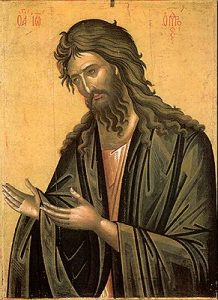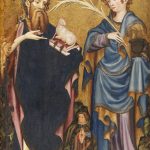A Prophet Arises
1.
We can imagine John’s fiery sermons by the Jordan: he tells the crowds to share their possessions, rebuking them for their greed; he rebukes the tax-collectors for stealing; he reproves the Roman soldiers who act like standover men and thugs.
John emerges as a preacher of justice, a preacher absolutely in the Jewish prophetic line. Wasn’t God’s justice the concern of so many of the prophets – Amos, Micah, Hosea, Jeremiah, Isaiah, and so on?
The appearance of the Baptist at the Jordan must have seemed a sudden re-emergence of Israel’s deepest tradition—a trumpet-blast, a blast from the past. Suddenly the common good mattered again, suddenly people mattered again. The Baptist spoke as a liberator, surely not as the stern moralist of popular imagining, like some ancient puritan. No, he recalled Israel to its national vocation to be a light to the nations. Life in Israel was not to be about domination, oppression, slavery, restlessness. Once life was like that, in Egypt, under Pharaoh. No more.
What was the tradition announced by the prophets?
 Marcus Borg says that the laws of the Pentateuch—namely the first five books of the bible “include some of the most radical economic principles in human history concerning land and debt.”
Marcus Borg says that the laws of the Pentateuch—namely the first five books of the bible “include some of the most radical economic principles in human history concerning land and debt.”
– Every family was to have its own land – to produce grain, fruit and vegetables, and to keep a few animals. So in Israel there would be no hunger.
– Agricultural land could not be bought or sold. Why? To prevent large landowners emerging; to prevent the growth of a peasant class;
– Debt was not entered into lightly—but only in the most serious circumstances, such as a drought, a bad crop, or illness that made it impossible to work. Debt was slavery. Therefore no interest was to be charged on debts. And every seventh year, all debts were to be forgiven.
Israel was not to be like Egypt; it was not to be a system of domination by king or by priest.
So all the people came to hear John’s fiery rebuke of greed, of the taxcollectors, of the Roman army.
2.
Let’s dwell a little more on Israel’s vocation. How did the prophet Amos put it?
Alas for those who lie on beds of ivory, and lounge on their couches, and eat lambs from the flock, and calves from the stall; who sing idle songs to the sound of the harp, and like David improvise on instruments of music who drink wine from bowls, and anoint themselves with the finest oils, but are not grieved over the ruin of [my people]! Amos 6.4-6
And the prophet speaks in the voice of God:
I hate, I despise your festivals, and I take no delight in your solemn assemblies. Even though you offer me your burnt offerings and grain offerings, I will not accept them; and the offerings of well-being of your fatted animals I will not look upon. Take away from me the noise of your songs; I will not listen to the melody of your harps. But let justice roll down like waters, and righteousness like an ever-flowing stream. (5.21-24)
I believe the Baptist was very much in this tradition: and, for that matter Jesus too, who announced – against king and priest – the reign of God. When God reigns, slavery ends. Both John and Jesus were of a piece, both of them critics of what one writer calls “the royal consciousness.”
Israel would not to be like Egypt.
3.
So we come to our own situation.
Doesn’t it seem that God’s justice is receding farther? The tide is going out, and out.
Yes, we have conquered poverty to a large extent – and yet many of us are in debt, many of us are numb from working long hours, and from long hours in the shopping centre. The common day of rest has been abolished. We have hundreds of surveillance cameras on every street.
What forms of slavery are we labouring under?
The Church gives us space to imagine another future. We come out, like all the people of Judea and Jerusalem, to wash ourselves in the Jordan, to let God into our hearts again.
Advent is a time for looking forward: we look forward not only to Christmas but to the end of history itself, to the flourishing society, where God reigns and Christ is known in our midst.
For now we dream, we struggle, we wait. We look to the end.
In the words of Jeremiah:
Again there shall be heard in the streets of Jerusalem, that are desolate, without man, and without inhabitant, and without beast – the voice of joy, and the voice of gladness, the voice of the bridegroom, and the voice of the bride, the voice of them that shall say, Praise the LORD of hosts: for the LORD is good; for his mercy endures for ever: and [the voice] of them that shall bring the sacrifice of praise into the house of the LORD.
Amen.
https://annunciation.org.au/uncategorized/advent-2-the-baptiser/

